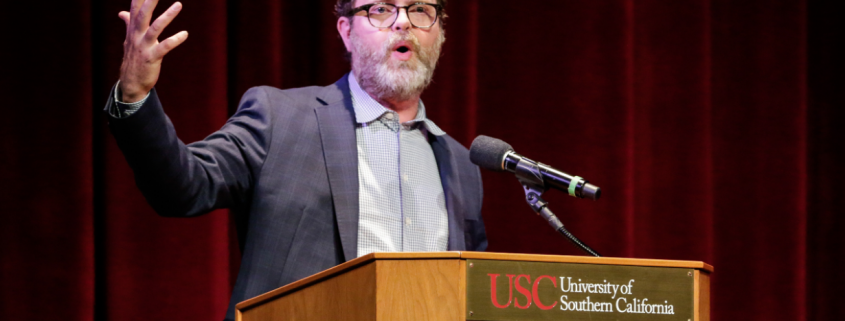Rainn Wilson talks spirituality, The Office

Students, faculty members and The Office fans flooded the three floors of Bovard Auditorium Thursday night to see actor and businessman Rainn Wilson speak about the interplay of creativity, activism, education and spirituality through his acting and his digital media company SoulPancake, which was founded in 2008 to “chew on life’s big questions.”
The event was coordinated by the USC Speakers Committee, the Academic Culture Assembly, Service Student Assembly, the Office of Religious Life and the School of Cinematic Arts.
Wilson, who is best known for playing the eccentric salesman Dwight Schrute, said that while he loved acting, at the start of his career, he felt disconnected and unsatisfied because he felt “something big was missing.”
Wilson turned to his own spiritual journey, rediscovering his Bahá’í Faith — which is centered on the unity of God, religion and humanity — after rejecting it when he moved to New York City to pursue acting.
“My parents had a house filled with ripe ideas,” Wilson said. “We had books on Buddhism, Hinduism … We had Jehovah’s Witnesses knocking on the door. My parents would invite them in and discuss the Bible with them and feed them pancakes. Rich ideas, really a great place to live.”
Once the workplace sitcom The Office grew in popularity in its second season in 2006, Wilson met with his friends, all members of the Bahá’í Faith, to found a grassroots movement that, according to Dean of Religious Life Varun Soni, “stimulates the brain and sparks the soul.” And thus, SoulPancake was born.
At the event, Wilson shared one story that was distributed through SoulPancake. Late teen singer Zach Sobiech, who garnered viral attention for his song “Clouds” in 2013, shared his experiences living his remaining days to the fullest after he found that his osteosarcoma was too advanced for treatment.
“One of life’s largest questions is around the universal fear we all share that we will die,” Wilson said. “And as Zach Sobiech said, ‘You don’t have to find out that you’re dying to start living.’ So it’s just one of life’s big questions that we got to explore at SoulPancake.”
Wilson then sat down with Soni, who moderated the second half of the event. Soni asked about Wilson’s experiences on The Office and beyond.
When he played Dwight, Wilson said he originally did not expect for the sitcom to take off in popularity as it did. However, he said that the show has embraced the “timeless quality” of family.
“People have come up to me and said, ‘You’ve inspired me so much. I want to work in an office just like you,’ and it’s just like, oh God, you are kidding me!” Wilson said. “But I think every great TV show is about one thing — it’s about family. The Office created one of the quirkiest and most original but one of the most loving families out there.”
But when Wilson found himself gaining popularity in his 40s, he said he experienced a clash between achieving his celebrity status and prioritizing his spirituality. According to Wilson, becoming an actor can come from a deep-seeded insecurity of wanting to be noticed and liked. And since Wilson said his spiritual path is rooted in humility, service and gratitude, he has had to turn to prayer, meditation and therapy to find his place as a spiritual being.
“[Coming here,] I feel like the Beatles and the Pope all rolled into one,” Wilson said. “It fulfills the worst parts of me. The worst parts of me are my ego, my entitlement and my narcissism … It’s been an incredible spiritual challenge.”
Delving into the universal struggle of self-consciousness, Soni addressed the rise of the social media landscape. According to Soni, social media acts as a double-edged sword, creating a sense of loneliness and disconnection among users, a belief that Wilson supported. However, noting the “dark side” of social media, Wilson said he has used his platform as an actor to instill important movements that can reach wide audiences.
“I’m whoring myself as Dwight to talk about some deep issues … and life’s biggest questions and what it means to be a human being and the spiritual energy that connects all of us,” Wilson said.
Montana Denton, a freshman majoring in public relations, said that while she did not expect Wilson to delve into his spiritual journey, she was able to learn more about Wilson as a person, not as the characters he played on the screen.
“I think it was really cool how he used Dwight as a platform to talk about greater issues and all of the things he has accomplished since then that people do not normally recognize him for,” Denton said.

